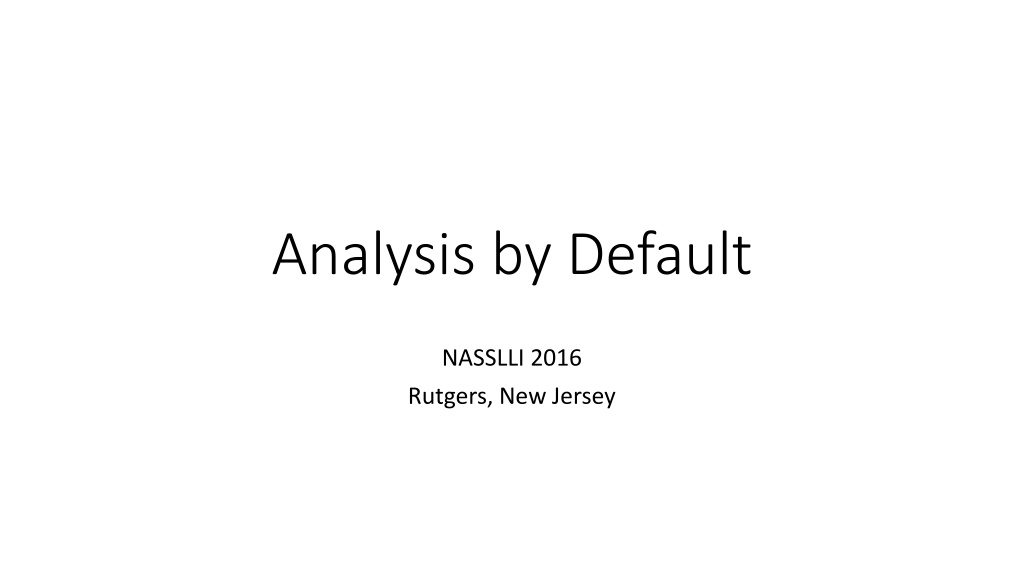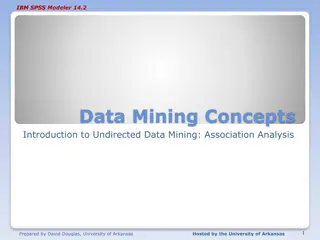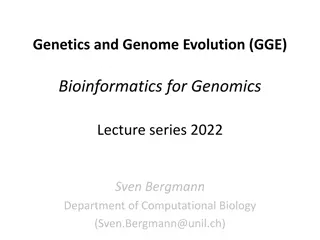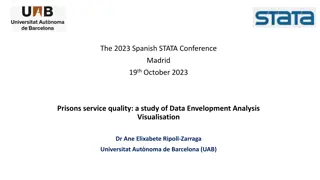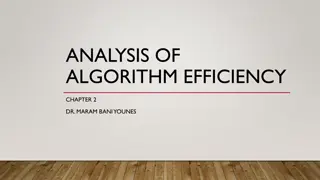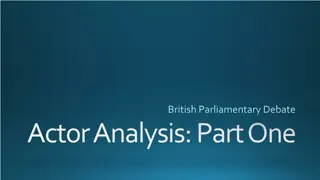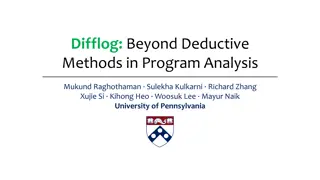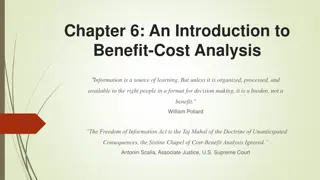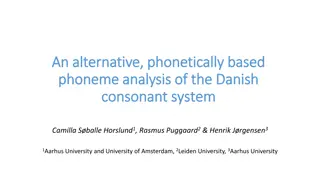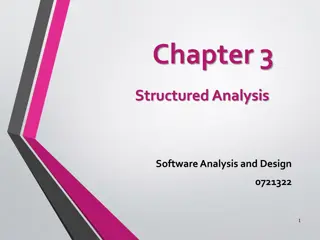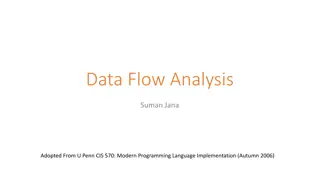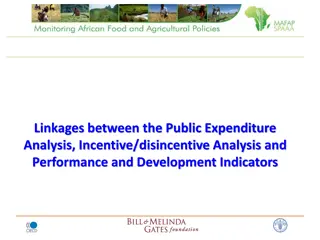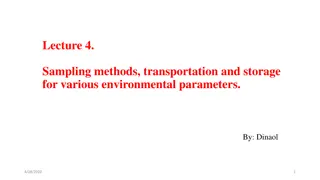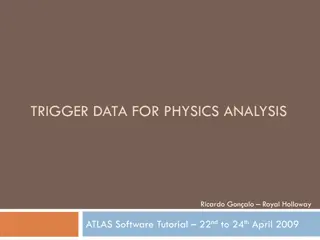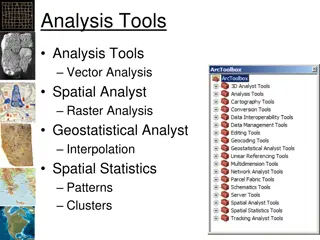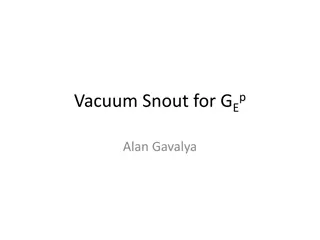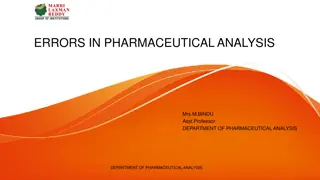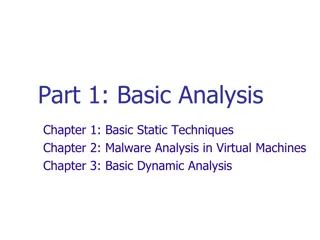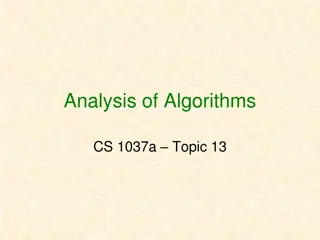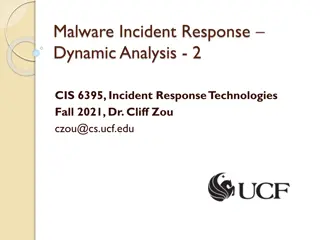Understanding Analysis and Its Importance
Explore the concept of analysis, its applications, and significance. Learn about different types of analysis, such as default logic and common law constraint. Delve into examples like the similarity of figures and the definition of a chair. Understand the reasons for analysis and how it helps in resolving disputes over meanings and multidimensional interpretations. Consider the role of ambiguity in language and the need for clarity in defining terms.
Download Presentation

Please find below an Image/Link to download the presentation.
The content on the website is provided AS IS for your information and personal use only. It may not be sold, licensed, or shared on other websites without obtaining consent from the author. Download presentation by click this link. If you encounter any issues during the download, it is possible that the publisher has removed the file from their server.
E N D
Presentation Transcript
Analysis by Default NASSLLI 2016 Rutgers, New Jersey
Schedule Today Conceptions and criticisms of analysis Tuesday and Wednesday Common law constraint, default logic, coding constraint into default logic Thursday Vagueness Friday Subjectivity
Example (similar figure) Figure A is similar to figure A .=. The ratio of the distance between any two points P, Q, on A and the distance between the corresponding points P , Q on A is constant. Df.
analysandum Example (similar figure) Figure A is similar to figure A .=. The ratio of the distance between any two points P, Q, on A and the distance between the corresponding points P , Q on A is constant. Df. analysans
Example (chair) A chair is a seat with a back and four legs, for one person to sit on.
Example (most) Most N means more than half of N
Example (knowledge) Knowledge is justified true belief
Getting by without analysis - Homophonic semantics ? ??? ???? ?? ?? ?? ???? - Abstract from meanings of non-logical expressions ???? ???? ????
Why analyse? - - - - - Distinguish different senses of a word Distinguish different senses of a word in different dialects Distinguish different senses of a word over time Examine disputes over meaning Multidimensionality
Ambiguity H2O is water Ice is H2O --------------------- Ice is water
Ambiguity H2O is watersense-1 Ice is H2O --------------------- Ice is watersense-2
Dialectical difference In Australian English, a hamburger is not a sandwich. In American English, a hamburger is a sandwich.
Meaning change Eighteenth-century meanings of English words: candour means, not frankness, but good-will, kindness discover, often not find, but reveal, disclose disgusting, not repulsive, but distasteful, boring meat, not necessarily flesh, but food in general sentiments, not feelings, but thoughts want, not desire, but lack
Semantic conflict Is a hotdog/ramen burger/tuna melt a sandwich?
Semantic conflict Is Secretariat an athlete? (Ludlow 2011)
Semantic conflict Is Secretariat an athlete? (Ludlow 2011) - pro: ran 1.5 miles in 2:24 (37.5 mph)
Semantic conflict Is Secretariat an athlete? (Ludlow 2011) - - pro: ran 1.5 miles in 2:24 (37.5 mph) con: is a horse
Multidimensionality Which line is curvier?
Criticisms of analysis - There is no criterion for an analytical statement (i.e. there is no analysis of analysis). There is no analytic/synthetic distinction (Quine). Outside of abbreviatory conventions in, e.g., mathematics, a true definition (one without counterexamples) has never been given. Empirical concepts don t have definitions (Waismann). - - -
Which statements are analytic? - - Bachelors are unmarried. Bachelors are untidy.
Which statements are analytic? - - (cf. Ascetics have matted hair; Bachelors don t wear a wedding ring.) Bachelors are unmarried. Bachelors are untidy.
Which statements are analytic? - - (cf. Ascetics have matted hair; Bachelors don t wear a wedding ring.) Bachelors are unmarried. Bachelors are untidy. - - A chair has a back. A chair was addressed by Clint Eastwood in a performance piece at the 2012 Republican Political Convention.
Which statements are analytic? - - Those known by any competent speaker of the language. Those known by anyone competent with the expression.
Which statements are analytic? - - Those known by any competent speaker of the language. Those known by anyone competent with the expression. - - Paradox of analysis How could an analysis ever be news ? Open question argument (G. E. Moore) It is good, but is it pleasure? Insofar as the question is open, there are two distinct concepts.
Competent with the language M. Jour. ... I must tell you something. I am in love with a person of high estate, and Iwould like you to help me to write something to her in a billet-doux, which I propose to let fall at her feet. Teach. Very good. M. Jour. Something very gallant. Teach. Certainly. Do you wish to write in verse? M. Jour. No, no, no verses. Teach. You only want prose? M. Jour. No. I do not want either prose or verse. Teach. It must really be either one or the other. M. Jour. Why? Teach. Because, monsieur, one can only express oneself in prose or verse. M. Jour. Is there nothing but prose or verse? Teach. No, monsieur: all that is not prose is verse; and all that is not verse is prose. M. Jour. And what is it when one speaks? Teach. Prose. M. Jour. What? when I say, Nicole, bring me my slippers, and give me my nightcap, is that prose? Teach. Yes, monsieur. M. Jour. Upon my word! I have spoken prose for more than forty years without knowing anything about it
Competent with the expression Soc. What is piety, and what is impiety? Euth. Piety is doing as I am doing; that is to say, prosecuting anyone who is guilty of murder, sacrilege, or of any other similar crime and not to prosecute them is impiety. Soc. But ... I would rather hear from you a more precise answer, which you have not as yet given, my friend, to the question, What is piety ? When asked, you only replied, Doing as you, charging your father with murder. Euth. And what I said was true, Socrates. Soc. No doubt, Euthyphro; but you would admit that there are many other pious acts? Euth. There are. Soc. Remember that I did not ask you to give me two or three examples of piety, but to explain the general idea which makes all pious things to be pious. Do you not recollect that there was one idea which made the impious impious, and the pious pious? Tell me what is the nature of this idea, and then I shall have a standard to which I may look. Euth. I will tell you, if you like. Soc. I should very much like. Euth. Piety, then, is that which is dear to the gods, and impiety is that which is not dear to them. Soc. Very good, Euthyphro; you have now given me just the sort of answer which I wanted. But whether what you say is true or not I cannot as yet tell, although I make no doubt that you will prove the truth of your words.
Competent with the expression - Euthyphro is competent with the expression piety ; for instance, he can adduce plausible cases. - But Socrates is not satisfied with the analysis he offers: Piety is that which is dear to the gods
Competent with the expression - When Astronomer Mike Brown asked people for the meaning of planet , the analyses he got were scientifically misguided : large rocky bodies in the solar system (well no, there are gas giants), things with moons (not Mercury or Venus!), things that are big enough to see with your eye (Uranus, Neptune and Pluto are out), things that pull the earth around in its orbit (that's just the Sun). - But when he asked people to name the planets, everyone gave the same answer, starting with Mercury and ending with Pluto.
Competent with the expression (analysis) - Competent users may not have memorized the definition (of similar figure or planet ). Competent users may not be able to extract a general definition from their robust understanding of particular cases. -
Competent with the expression (cases) - - Competent users can differ on particular cases (such as Secretariat). Competent users can be ignorant about particular cases (does 6 count as tall?). Competent users can be wrong about particular cases (Pluto is a planet). Hence they do not always know to what things the term can be applied correctly. - -
Which statements are analytic? - Those that are non-contingent.
Non-contingency - A circle is a plane figure, every point of which is equidistant from a fixed point.
Non-contingency - A circle is drawn on this page.
Non-contingency - A circle is drawn on this page.
Non-contingency - A circle is drawn on this page. (accident)
Non-contingency - A circle is a plane figure, every point of which is equidistant from a fixed point. (definition) Necessarily, a circle is a plane figure, every point of which is equidistant from a fixed point. -
Non-contingency - A circle has the maximum area for a given perimeter.
Non-contingency - - A circle has the maximum area for a given perimeter. (property) Necessarily, a circle has the maximum area for a given perimeter.
Non-contingency - A chair has a back.
Non-contingency - - A chair has a back. Necessarily, a chair has a back.
Non-contingency - - A chair has a back. Necessarily, a chair has a back.
Which statements are analytic? - - Those known by any competent speaker of the language. Those known by anyone competent with the expression. - A competent speaker is one who knows a language to a satisfactory degree. One competent with an expression knows its meaning to a satisfactory degree. - - A natural language is a system of conventions that specify the meanings, and certain other properties, of a set of expressions.
Which statements are analytic? - Those that explicate the meaning of a term.
Which statements are analytic? - - Those that explicate the meaning of a term. While ascetics may be recognized by their matted hair, having matted hairis not part of the meaning of ascetic .
Which statements are analytic? - A predicate has an application condition determined by linguistic convention. When a predicate applies to an object, it is due to the fact that the features of the object satisfy the application condition. When ascetic applies to someone, it is never (even in part) due to the fact that they have matted hair. When chair applies to something, it may be due (in part) to the fact that it has a back. - - -
